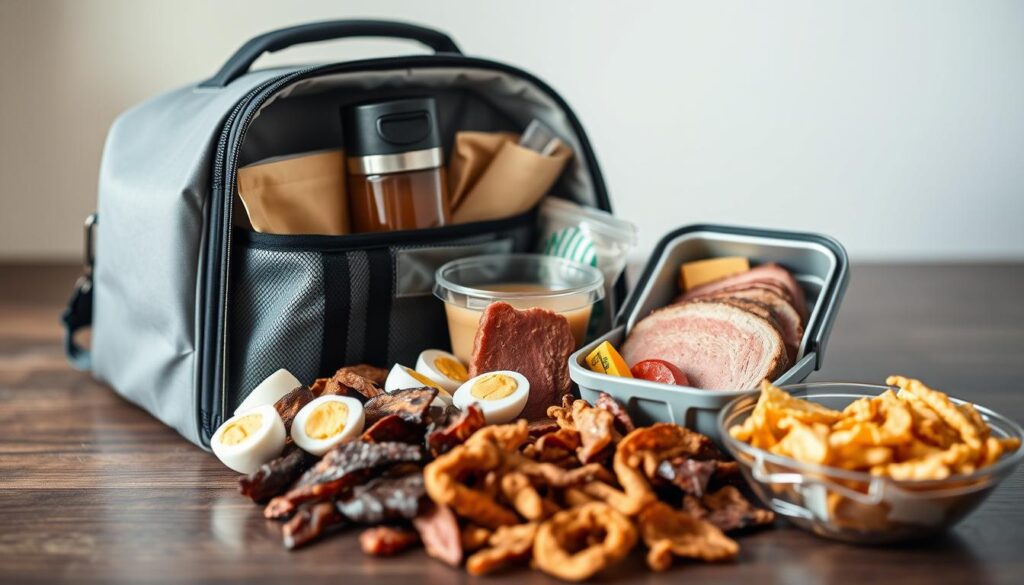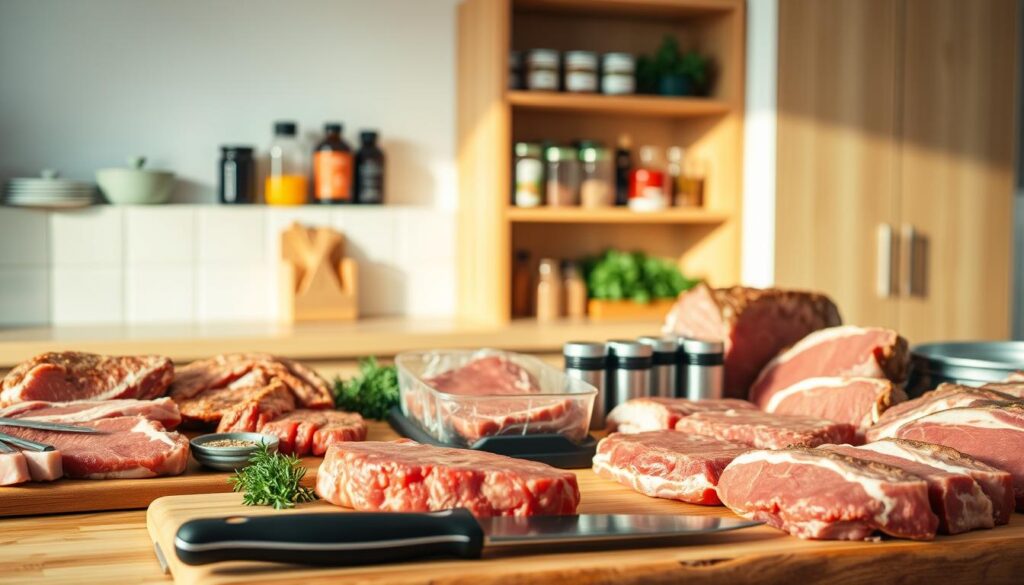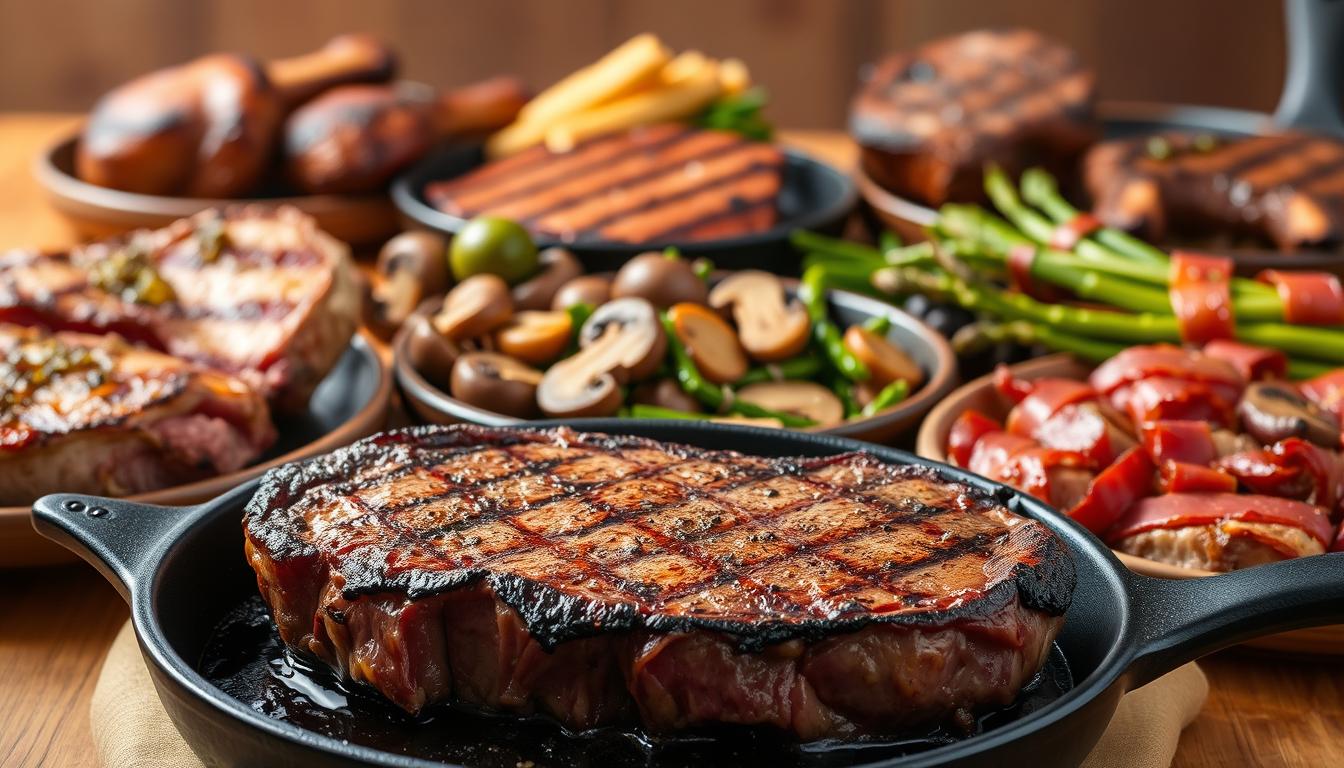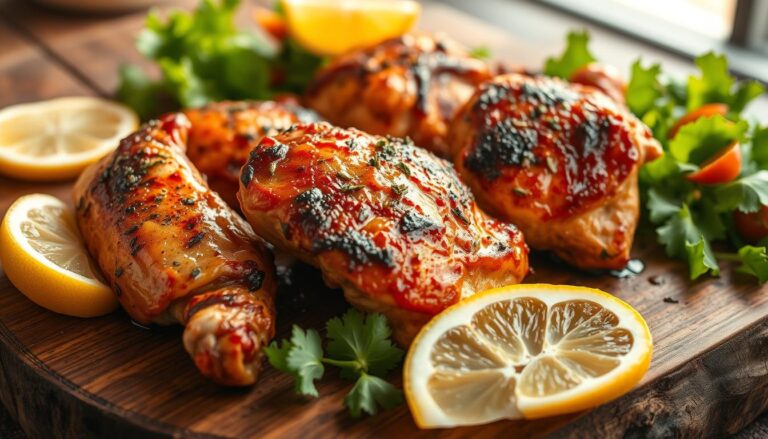carnivore diet recipes
Embracing a meat-based diet can be a transformative experience for those looking to improve their overall health and wellbeing. The carnivore diet, which focuses on consuming animal products, has gained popularity for its simplicity and effectiveness. By incorporating a variety of meat-based meals into your daily routine, you can potentially see significant benefits.
This article will guide you through the world of carnivore diet recipes, providing you with a comprehensive carnivore diet meal plan to get you started. You’ll discover delicious and healthy meal ideas that are easy to prepare and packed with nutrients.
Key Takeaways
- Understanding the basics of the carnivore diet
- Exploring the benefits of a meat-based diet
- Discovering simple and delicious carnivore diet recipes
- Creating a personalized carnivore diet meal plan
- Tips for successfully implementing the carnivore diet
What is the Carnivore Diet?
Adopting a carnivore diet means embracing a meat-based eating plan that excludes plant-based foods. This diet has gained popularity for its simplicity and potential health benefits.
Core Principles and Food List
The carnivore diet is centered around consuming animal products. The core principles include eating meat, fish, and other animal-derived foods while eliminating all plant foods. The diet typically includes:
- Beef
- Pork
- Chicken
- Fish
- Eggs
- Organ meats
Some followers also consume dairy products and honey, although these are not universally accepted as part of the diet.
Health Benefits and Potential Challenges
Proponents of the carnivore diet report several health benefits, including weight loss, improved mental clarity, and reduced inflammation. However, potential challenges include:
| Challenge | Description |
|---|---|
| Nutrient Deficiencies | Risk of lacking certain vitamins and minerals found in plant-based foods. |
| Digestive Issues | Some individuals may experience constipation or other digestive problems. |
| Social and Practical Challenges | Dining out or eating with others can become complicated. |
It’s essential to weigh these factors and consult with a healthcare professional before adopting the carnivore diet.
Essential Ingredients for Your Carnivore Kitchen
Stocking your carnivore kitchen requires a focus on high-quality meat sources and essential cooking fats. The carnivore diet is straightforward, focusing primarily on animal products. To make the most out of this diet, understanding the core ingredients is crucial.
Primary Meat Sources
The carnivore diet thrives on a variety of meats, providing a broad spectrum of nutrients. The primary meat sources can be categorized into several key groups:
Beef, Lamb, and Game Meats
Beef, lamb, and game meats are staples in the carnivore diet, offering rich sources of protein and iron. Grass-fed beef is particularly noted for its nutritional benefits, including higher levels of omega-3 fatty acids.
Pork, Poultry, and Seafood
Pork, poultry, and seafood provide variety and are rich in essential nutrients. For instance, organ meats from these animals are highly nutritious, offering concentrated doses of vitamins and minerals.
Acceptable Seasonings and Cooking Fats
While the carnivore diet is centered around meat, certain seasonings and cooking fats are considered acceptable. Salt is a staple seasoning, used not just for flavor but also for its health benefits. When it comes to cooking fats, animal fats such as lard and tallow are preferred for their high smoke points and nutritional value.
Some proponents of the diet also use zero-carb spices and herbs to add variety to their meals without compromising the diet’s principles.
Carnivore Diet Recipes for Beginners
Starting your carnivore diet journey doesn’t have to be daunting; here are some beginner-friendly recipes to get you started. The carnivore diet is all about simplicity and focusing on meat, making it easier to prepare meals that are both delicious and satisfying.
Simple Ground Beef Recipes
Ground beef is a versatile ingredient that can be used in a variety of dishes. Here are two simple recipes to get you started.
Basic Beef Patties
Forming beef patties is a straightforward process that requires minimal ingredients. Simply shape your ground beef into patties and cook them in a pan until they’re cooked through. Tips: Use a cast-iron pan for even cooking, and don’t press down on the patties while they’re cooking.
Seasoned Beef Bowls
For a quick and easy meal, season your ground beef with salt and your choice of seasonings, then cook it in a pan. Serve it in a bowl, and you’re done! You can also add some optional toppings like cheese or a fried egg if you’re feeling fancy.
Easy Pork and Chicken Preparations
Apart from ground beef, pork and chicken are other great options for the carnivore diet. Here are some simple recipes.
Pan-Seared Pork Chops
Pork chops are a great cut of meat that can be cooked to perfection in a pan. Season them with salt and pepper, then sear them in a hot pan until they’re golden brown and cooked through.
Crispy Chicken Thighs
Chicken thighs are another favorite among carnivore diet followers. To make them crispy, season them with your favorite spices, then bake them in the oven until they’re golden and crispy.
These recipes are just the beginning of your carnivore diet journey. Feel free to experiment with different meats and seasonings to keep your meals interesting.
Hearty Carnivore Breakfast Recipes
Carnivore breakfast recipes focus on simplicity and flavor, using eggs and various meats. These recipes are designed to be hearty and satisfying, providing the energy needed for the day ahead.
Egg-Based Morning Meals
Eggs are a staple in many breakfast recipes, and on a carnivore diet, they’re often combined with other meats for added protein.
Carnivore Omelets and Scrambles
Omelets and scrambles are versatile dishes that can be made with eggs and a variety of meats such as bacon, sausage, or ham. Adding different meats can enhance the flavor and nutritional value.
Egg and Meat Muffins
Egg and meat muffins are a convenient breakfast option. They’re made by baking eggs and meats like sausage or bacon in muffin tins, creating a portable meal.
Breakfast Meat Preparations
Meat is a central component of a carnivore breakfast, with options ranging from bacon and sausage to steak.
Bacon and Sausage Variations
Bacon and sausage are popular breakfast meats that can be prepared in various ways. Experimenting with different seasonings can add variety to these dishes.
Steak and Eggs Combinations
A classic carnivore breakfast combination is steak and eggs. This pairing provides a filling meal that’s rich in protein.
| Breakfast Recipe | Main Ingredients | Preparation Time |
|---|---|---|
| Carnivore Omelet | Eggs, Bacon, Sausage | 15 minutes |
| Egg and Meat Muffins | Eggs, Sausage, Bacon | 20 minutes |
| Steak and Eggs | Steak, Eggs | 25 minutes |
Satisfying Lunch and Dinner Options
Exploring lunch and dinner options on the carnivore diet reveals a world of flavorful possibilities. The diet, which focuses on animal-based foods, offers a variety of choices for both lunch and dinner. This section will explore some of the most satisfying options.
Steak Variations
Steak is a staple in the carnivore diet, and there are numerous ways to prepare it. From ribeye to strip steak, the options are endless.
Ribeye and Strip Steak Preparations
Ribeye and strip steak are popular choices due to their tenderness and rich flavor. Grilling or pan-searing these steaks can bring out their natural flavors.
Budget-Friendly Cuts and Cooking Methods
For those on a budget, cuts like flank steak or skirt steak are affordable and delicious when marinated and grilled. Slow-cooking methods can also tenderize tougher cuts.
Organ Meat Delicacies
Organ meats are not only nutritious but also offer a range of flavors. They can be prepared in various ways to suit different tastes.
Liver and Heart Recipes
Liver and heart are rich in nutrients and can be cooked in a variety of ways, such as sautéing or grilling. They can be seasoned with simple spices to enhance their natural flavors.
Bone Marrow Dishes
Bone marrow is considered a delicacy by many and can be roasted or grilled. It’s a rich source of nutrients and can be served as a main dish or used as an ingredient in other recipes.
Seafood Options
For those who consume seafood, the carnivore diet offers a range of options. Fatty fish and shellfish are not only delicious but also packed with nutrients.
Fatty Fish Recipes
Fatty fish like salmon and mackerel are rich in omega-3 fatty acids. They can be grilled, baked, or pan-seared with simple seasonings.
Shellfish Preparations
Shellfish, including oysters and mussels, are nutritious and can be prepared by steaming or grilling. They are a great source of protein and various minerals.
These lunch and dinner options showcase the variety available on the carnivore diet. By incorporating different types of meat, organ meats, and seafood, individuals can enjoy a diverse range of meals.
On-the-Go Carnivore Diet Recipes
On-the-go eating is a necessity for many, and with the carnivore diet, you can enjoy a variety of meat snacks that are both satisfying and diet-compliant. Whether you’re heading to work, going on a hike, or just need a quick energy boost, there are several options to choose from.
Quick Meat Snacks
For those in a hurry, pre-cooked meat and deli selections can be lifesavers. Here are some convenient options:
Pre-Cooked Meat Options
Pre-cooked meats like chicken, beef, or pork are great for snacking on the go. Simply cook a batch, portion them out, and you’re ready to go.
Carnivore-Friendly Deli Selections
Many deli counters offer carnivore-friendly options like roast beef, turkey, or ham. Just be sure to check the ingredients to avoid any non-carnivore diet additives.

Homemade Jerky and Pemmican
Making your own jerky and pemmican can be a fun and rewarding process, and it’s a great way to ensure you’re getting the nutrients you need while on the go.
Beef Jerky Preparation
Beef jerky is a classic on-the-go snack. To make it, slice beef into thin strips, marinate it in your favorite seasonings, and dry it in a dehydrator or your oven on the lowest heat setting.
Traditional Pemmican Recipe
Pemmican is a high-energy mixture of fat and protein. To make it, combine rendered animal fat with dried meat (usually beef or bison), and sometimes berries for added flavor. Mix well and store in airtight containers.
| Snack | Preparation Time | Nutritional Highlights |
|---|---|---|
| Beef Jerky | 4 hours | High in protein, low in carbs |
| Pemmican | 2 hours | Rich in fat and protein |
| Pre-cooked Chicken | 1 hour | High in protein, versatile |
Advanced Cooking Techniques for the Carnivore Diet
Discover the art of cooking meat to perfection with sous vide, smoking, and slow-cooking methods. These advanced techniques can elevate your carnivore diet experience, making every meal a culinary delight.
Sous Vide Meat Preparation
Sous vide cooking involves sealing meat in airtight bags and cooking it in a water bath at a precisely controlled temperature. This method ensures that your meat is cooked to the perfect doneness every time.
Perfect Temperature Guide
The key to successful sous vide cooking is understanding the ideal temperatures for different types of meat. For example, a tender steak can be cooked to a perfect medium-rare at 130°F to 135°F.
Sous Vide Carnivore Recipes
Try cooking a ribeye steak sous vide with a simple seasoning of salt and pepper, or experiment with more complex flavors like garlic and thyme. The precision of sous vide cooking allows for endless creativity in your carnivore recipes.
Smoking and Slow-Cooking Methods
Smoking and slow-cooking are techniques that not only tenderize meat but also infuse it with rich, complex flavors. These methods are perfect for those who enjoy the deep, smoky taste that comes from low and slow cooking.
Smoked Brisket and Ribs
A classic smoked brisket is a staple of carnivore cuisine, with its tender texture and deep, smoky flavor. Similarly, smoked ribs fall-off-the-bone and are packed with flavor.
Slow-Cooked Roasts and Stews
Slow-cooking is ideal for tougher cuts of meat, turning them into tender, flavorful roasts and stews. A slow-cooked beef roast with a side of organ meats can make for a hearty carnivore meal.
As renowned chef,
“The art of cooking is not just about following a recipe, it’s about understanding the nuances of flavor and texture.”
– This quote encapsulates the essence of advanced cooking techniques, where the goal is to enhance the natural flavors of the ingredients.
By incorporating these advanced cooking techniques into your carnivore diet, you can enjoy a more varied and satisfying culinary experience. Whether you’re a seasoned chef or a beginner, the world of advanced cooking offers endless possibilities for exploration and discovery.
Meal Planning and Preparation Strategies
Effective meal planning is crucial for maintaining a successful carnivore diet. By organizing your meals in advance, you can ensure that you’re sticking to your dietary goals while also saving time and money.
Weekly Carnivore Meal Prep Guide
Creating a weekly meal prep guide can simplify your carnivore diet journey. Start by planning your meals around core carnivore foods such as beef, pork, chicken, and fish.
Batch Cooking Techniques
Batch cooking is an efficient way to prepare meals for the week. It involves cooking large quantities of meat at once, which can then be portioned out into individual servings. This technique not only saves time but also ensures consistency in your diet.
Storage and Reheating Tips
Proper storage and reheating are crucial for maintaining the quality and safety of your prepped meals. Use airtight containers to store your cooked meats and reheat them thoroughly to an internal temperature of at least 165°F (74°C).
“Meal prep is a game-changer for anyone on a carnivore diet. It eliminates the guesswork and ensures you’re always prepared.”
Budget-Friendly Carnivore Shopping
Eating a carnivore diet doesn’t have to break the bank. There are several strategies you can employ to make your shopping more budget-friendly.
Buying in Bulk and Using Sales
Buying meat in bulk can significantly reduce your costs over time. Look for sales on larger cuts of meat and consider splitting bulk purchases with friends or family.
| Meat Type | Bulk Price | Regular Price |
|---|---|---|
| Grass-Fed Beef | $3.99/lb | $5.99/lb |
| Pasture-Raised Chicken | $2.49/lb | $3.99/lb |
Working with Butchers and Farmers
Building a relationship with local butchers and farmers can provide you with access to high-quality meats at competitive prices. They can also offer valuable advice on the best cuts and how to prepare them.

By implementing these meal planning and preparation strategies, you can enjoy a convenient, cost-effective, and satisfying carnivore diet.
Conclusion: Thriving on Your Carnivore Journey
Embarking on a carnivore diet can be a transformative experience, offering numerous health benefits and a deeper connection to the food you eat. By incorporating the recipes and meal planning strategies outlined in this article, you can set yourself up for success on your carnivore journey.
A thriving carnivore diet is not just about the food; it’s about adopting a lifestyle that prioritizes simplicity, quality, and flavor. Focus on sourcing high-quality meats and experimenting with different cooking techniques to keep your meals exciting and satisfying.
As you continue on your carnivore journey, remember that thriving on this diet is about more than just the food you eat – it’s about cultivating a positive and healthy relationship with what you consume. By doing so, you’ll be well on your way to reaping the rewards of a carnivore lifestyle and enjoying the many benefits that come with it, ultimately thriving on your carnivore diet.







